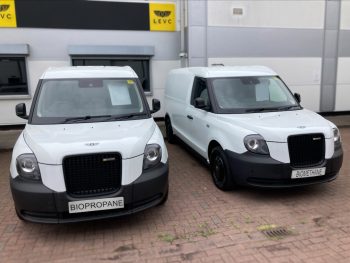LEVC’s range-extender VN5 van and its TX taxi counterpart have been converted to use alternative fuels instead of petrol to help cut emissions and costs for fleet operators.

Launched in 2020 by Geely-owned LEVC, the VN5 uses the e-City range-extender technology already seen in LEVC’s TX taxi and featuring a 31kWh lithium-ion battery with a three-cylinder petrol engine as a range extender. This gives an electric-only range of 58 miles (93km) and a total range of 300 miles (484km).
It’s already positioned as a cleaner alternative to diesel vans for ‘distribution-to-door’ – not just last-mile – services.
But a new partnership has evolved the VN5 and TX further.
Under the tie-up between HP Taxis, Prins Alternative Fuel Systems and engine research and development consultancy SBL-Automotive, the range-extender engine has been adapted to use compressed natural gas (CNG), biomethane, liquefied petroleum gas (LPG) or biopropane alternative and renewable fuels in place of petrol.
This cuts carbon emissions from the range extender engine by 10% when LPG is used and 20% when CNG is used.
The vehicles can also adopt net zero carbon emission renewable fuel biomethane (replaces CNG) and net zero carbon emission renewable fuel biopropane (replaces LPG), reducing CO2 by 99%.
Biomethane and biopropane are ‘drop-in’ replacement fuels for CNG and LPG and require no changes to refuelling infrastructure or to a vehicle already developed with a bi-fuel fuel system (CNG or LPG).
Biomethane and biopropane can both be made from waste feedstocks such as food waste, farm waste and sewage and both are in volume production already.
Furthermore, all of these fuels – which are available today – can also deliver 30-50% operating cost savings, according to the firms.
And further savings are expected as biomethane and biopropane production volumes continue to ramp up.
Meanwhile, the vehicles’ operating ranges, when powered by the range-extended engine, are increased by around 90% (LPG/biopropane) and some 70% (CNG/biomethane) following the installation of the bi-fuel system, as the original petrol tank is also retained.
The three firms are also working with fuel manufacturers and suppliers to grow the existing refuelling station network for CNG, biomethane, LPG and biopropane.
Pricing details have not been announced but interested fleets can contact the firms via the website.

